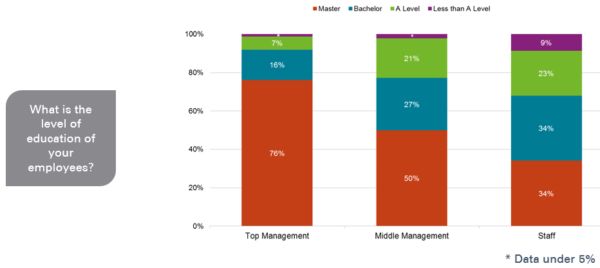"Now, this is not the end. This is not even the beginning of the end. But it is, perhaps, the end of the beginning!"
These Churchillian words may, depending on your political wind, chime with today's UK: if Brexit marked the first battle won towards a brand new Britain, then it was certainly a major leap—but, with tough negotiations set to begin with Europe shortly, it's far from the end. One obstacle that remains is business. London had become the beating heart of the EU, serving as a financial hub for investors, but now, one year after the Brexit vote, UK businesses are looking to relocate to the EU in order to preserve their access to the so-called single market. Amongst several candidates, Luxembourg has emerged on many shortlists as a new home, with many competitive advantages in the financial and political arenas.
One key question for businesses considering relocating to Luxembourg is people, as people constitute a key competitive differentiator. In this article, we will dive into recruitment issues and the main lifecycle of an employee working in Luxembourg, following a Q&A format. In the following weeks, look for more articles here on the KPMG Blog as we explore various people-related obstacles and opportunities for businesses journeying toward Luxembourg. We hope you'll see that the opportunities far outweigh the obstacles—after all, Luxembourg's motto is "Let's make it happen!"
Who is allowed to work in Luxembourg without a permit?
Non-EU citizens need a work permit to work in Luxembourg, whereas EU citizens enjoy freedom of movement within the bloc and therefore require no such permit.
As long as the UK is part of the EU, UK citizens are free to live and work in Luxembourg. After the UK exits the EU, however, that could change. We won't know the exact outlook before the upcoming negotiations, but currently there is talk about a "hard Brexit" and a "soft Brexit."
- Hard Brexit: the UK gives up its full access to the EU single market and to the customs union. Citizens from the UK would be treated as any other third-country national needing a visa and work permit to live and work in Luxembourg.
- Soft Brexit: the relationship between the UK and the EU would remain close to the existing arrangements, along the lines of what exists with the EEA and with Switzerland. There are various shapes this could take. A soft Brexit would have the UK committing to the four freedoms of the EU, meaning that UK citizens could still work and live in Luxembourg without needing a work permit.
The outcome of the negotiations will significantly affect the formalities surrounding UK citizens' ability to live and work in Luxembourg.
Do you have to speak French to work in Luxembourg?
Not necessarily. Nestled among France, Germany, and Belgium, and having experienced waves of immigration from southern European countries, Luxembourg is a cultural and professional crossroads. Many languages are spoken in addition to the native Luxembourgish; it would be commonplace, for example, to hear four or five different languages while riding a city bus. As the international business language, English is required to work in Luxembourg's finance industry, with French or German usually considered as a plus, depending on the work environment. Education First's 2016 ranking of English proficiency (excluding countries where English is the primary tongue) ranked Luxembourg seventh worldwide, a testament to the country's emphasis on multilingualism.
Is Luxembourg host mostly to back-office employees?
Despite many assumptions about Luxembourg, it is not a letterbox country. As such, the answer is no: many companies are headquartered here with adequate substance levels. Over the years, the country has developed its expertise in finance, leveraging on what the EU offers, especially for the funds industry. As with the digital transformation worldwide, Luxembourg's workforce has evolved according to new needs and skillsets, with a particular focus on talents in its main industries of finance and technology. This talent pool is drawn from many nearby hubs of education in France, Belgium, Germany, the UK, and the Netherlands, together with the University of Luxembourg itself, which is attracting more and more experts set on pushing boundaries in research areas of finance, robotics, data management, and others.

Data taken from the 2015 KPMG Remuneration
Survey.
Can any firm be granted subsidies by the Luxembourg government to fund employee training programmes?
Yes: by helping to finance company training initiatives, Luxembourg encourages employers to keep their people highly trained. To that end, private sector firms established in Luxembourg can receive a subvention or a public co-funding of their training programmes from the Institut National pour le développement de la Formation Professionnelle Continue. This subvention amounts to 20% of the annual invested sum, and 35% of participants' salary expenses (with certain criteria to be met). Luxembourg additionally provides for individuals to take training leave.
Do you need to work for ten years in Luxembourg before qualifying for a full pension?
No. The Luxembourg (state) pension is part of the social security system. To be entitled to it, you must have contributed to the Luxembourg social security system for at least one year, and have contributed to another qualifying social security system for at least ten years. A qualifying social security system means any social security system of an EU or EEA Member State, or of a country with which Luxembourg has an active social security agreement.
The amount of pension depends on how long the employee has contributed to the Luxembourg social security system and on his/her income during this period. In addition, most Luxembourg companies offer their employees a supplementary pension scheme with statutory benefits.
Luxembourg looking forward
Luxembourg is a multicultural country whose workforce is diverse, qualified, and multilingual. By seeing its workers as its most valuable commodity, the Luxembourg government strives to ensure professional development, and thereby employability, from the recruitment stage until retirement. Luxembourg is aligned with European prerogatives but has its own employment practices too. To that end, watch this space for our next article, which will address Luxembourg employment contracts and employee/employer relations here in the Grand Duchy.
The content of this article is intended to provide a general guide to the subject matter. Specialist advice should be sought about your specific circumstances.

